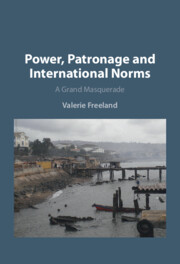Book contents
- Power, Patronage and International Norms
- Power, Patronage and International Norms
- Copyright page
- Contents
- Acknowledgements
- Abbreviations
- 1 Masquerading in International Relations
- 2 Peripherality and Patronage in International Relations Theory
- 3 The Strategic Life of Peripheral-Patronage States
- 4 Uganda’s Self-referral to the International Criminal Court
- 5 Sierra Leone’s Truth Commission and Tribunal
- 6 Georgia’s Western Ambitions
- 7 The Long-term Effects of Strategizing
- 8 Conclusion
- Appendix
- Glossary
- Bibliography
- Index
4 - Uganda’s Self-referral to the International Criminal Court
Published online by Cambridge University Press: 01 November 2024
- Power, Patronage and International Norms
- Power, Patronage and International Norms
- Copyright page
- Contents
- Acknowledgements
- Abbreviations
- 1 Masquerading in International Relations
- 2 Peripherality and Patronage in International Relations Theory
- 3 The Strategic Life of Peripheral-Patronage States
- 4 Uganda’s Self-referral to the International Criminal Court
- 5 Sierra Leone’s Truth Commission and Tribunal
- 6 Georgia’s Western Ambitions
- 7 The Long-term Effects of Strategizing
- 8 Conclusion
- Appendix
- Glossary
- Bibliography
- Index
Summary
The Ugandan government was the first to engage with the International Criminal Court and did so via the then-unexpected mechanism of self-referral when it requested an investigation into its conflict with the Lord’s Resistance Army in the country’s north. While this seems like evidence of the government accepting global norms of accountability for atrocities in wartime, it entailed significant risk for the Museveni regime. The Uganda People’s Defence Force, essentially fused to the ruling regime, has committed acts within that conflict that may have amounted to war crimes and crimes against humanity. Moreover, these are bound to occur whenever the UPDF is deployed – as it usually is – since its function as a vessel for distribution of patronage makes it a blunt instrument strongly tending towards indiscriminate use of force. Yet Museveni was able to use the country’s centrally managed illegibility to help control the process of ICC scrutiny and gained further leverage through a strong asymmetrically interdependent relationship to the brand new court. This allowed Uganda to emerge better than unscathed, not only with warrants only issued for LRA high command, but with newfound international support for a military solution to the Northern crisis where once he found only criticism due to the rights violations it invariably generated.
Keywords
- Type
- Chapter
- Information
- Power, Patronage and International NormsA Grand Masquerade, pp. 80 - 110Publisher: Cambridge University PressPrint publication year: 2024

